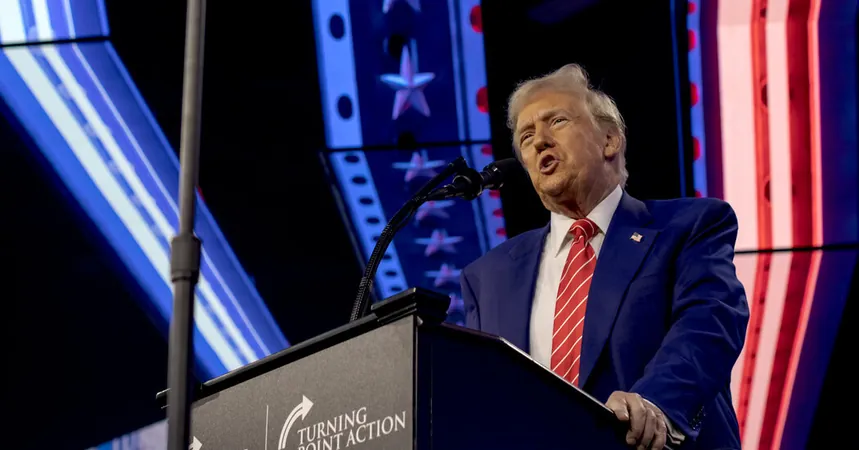
Trump's Manifest Destiny: Ambitions Beyond Borders?
2025-01-13
Author: Ken Lee
Trump's Territorial Aspirations
As President-elect Donald Trump approaches his inauguration, his controversial ideas about expanding U.S. territory have sparked international apprehension. Notably, Trump has publicly mused about the possibility of pressuring Canada to merge with the United States while also eyeing Greenland and even the Panama Canal. These proclamations have led lawmakers to reassure the public that an invasion of these regions is not on the agenda, with Republican Senator James Lankford stating emphatically that “The United States is not going to invade another country.”
Drawing Parallels Between Past and Present
So, what’s really driving Trump's fixation with territorial expansion? It appears to echo a recurring theme throughout his career: an insatiable desire for growth and dominance. His comments may well serve as a dramatic negotiating tactic rather than a genuine foreign policy shift; nevertheless, they reflect a mindset that has characterized Trump’s business ventures since the 1980s.
Trump's inclination to acquire and control has historical parallels. In the early stage of his real estate career, he made headlines by attempting to demolish a Central Park South building to erect a luxury condominium. Rather than opting for a standard buyout, he allegedly attempted to force tenants out, skipping necessary maintenance and issuing eviction notices. Ultimately, the tenants won their battle, forcing Trump to scrap his plans.
Similarly, during his tenure as a casino mogul in Atlantic City, Trump ordered workers to paint nearby homes to enhance the aesthetic appeal of Trump Plaza—without consent from any homeowners. This disregard for others' rights raises questions about how his previous business practices reflect his political aspirations.
A New Kind of Expansionism
Trump's current musings about “taking” land on a global scale have drawn comparisons to his past reckless business decisions. In previous political commentary, he suggested that the U.S. should seize oil fields controlled by ISIS, a stark illustration of his cavalier approach to international norms and sovereignty. His interest in Greenland dates back to his first presidency, when he contemplated leasing the territory—an autonomous part of Denmark.
In a recent social media post, Trump illustrated his ambitions with an altered map of North America, whimsically painting Canada in American colors and captioning it "Oh Canada!" This displays a striking sense of entitlement, and could be seen as a microcosm of his broader approach to life: viewing the world as his canvas.
Resistance and Reality Check
However, just as he faced pushback during his business ventures, Trump should expect similar resistance on the world stage. The leaders of Greenland and Panama have made it abundantly clear that they have no intention of ceding their autonomy. Historical attempts to force change without consent often result in significant backlash and failure.
Furthermore, as political tensions rise and nations increasingly prioritize sovereignty, Trump's seemingly naive extroversion may not yield the results he envisions. While he continues to float grandiose ideas, the reality of global politics and the commitment to diplomacy might ground him more deeply in the challenges of international governance.
As Trump assumes office, the world is left to wonder: will his past inform his future, or will he forge a new path that blurs the lines of negotiation and sovereignty? Only time will tell, but one thing is clear—America's mantra of "Manifest Destiny" may be evolving in a decidedly unconventional manner.



 Brasil (PT)
Brasil (PT)
 Canada (EN)
Canada (EN)
 Chile (ES)
Chile (ES)
 Česko (CS)
Česko (CS)
 대한민국 (KO)
대한민국 (KO)
 España (ES)
España (ES)
 France (FR)
France (FR)
 Hong Kong (EN)
Hong Kong (EN)
 Italia (IT)
Italia (IT)
 日本 (JA)
日本 (JA)
 Magyarország (HU)
Magyarország (HU)
 Norge (NO)
Norge (NO)
 Polska (PL)
Polska (PL)
 Schweiz (DE)
Schweiz (DE)
 Singapore (EN)
Singapore (EN)
 Sverige (SV)
Sverige (SV)
 Suomi (FI)
Suomi (FI)
 Türkiye (TR)
Türkiye (TR)
 الإمارات العربية المتحدة (AR)
الإمارات العربية المتحدة (AR)